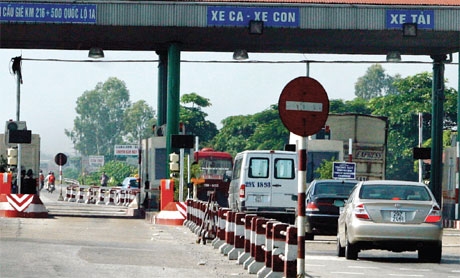For whom the toll bells

Mid this month highway developer Vietnam Expressway Corporation (VEC) as seller and Hai Chau Group as buyer reached an agreement on extending the toll collection contract deadline they signed on June 16, 2007 to October 19, 2012, some 108 days more after the contract expired on June 30, 2012.
The aim was to help buyer cover part of losses due to unexpected factors during contract implementation which hurt buyer’s capital recovery efforts.
“The bottleneck, which may trigger conflicts between relevant parties, will now be addressed albeit we still need approval from the Ministry of Transport,” said VEC’s deputy general director Luong Quoc Viet.
Earlier Hai Chau Group reportedly still incurred VND17.9 billion ($855,000) losses at the time the contract expired. In reality, during the five-year implementation period some factors arose hurting the buyer’s revenue, including first-phase modern expressway Cau Gie-Ninh Binh opened to traffic from November 15, 2011.
When the toll collection right transfer contract, the first of its kind in Vietnam by that time, was signed on June 16, 2007, seller and buyer had agreed to extend toll collection duration when there arose unexpected factors adversely affecting contract implementation.
But the contract had yet to include the method of calculating toll collection extended time so that each party had its own argument. Hai Chau Group said it would need 261 days more after the contract expired (June 30), whereas VEC said the additional time would be 39 days only.
When agreement was yet to be reached, the ministry sent Document 5362/BGTVT-TC dated July 12, 2012 requiring Hai Chau Group to hand-over Nam Cau Gie toll station for it to give it to other investor in a bid to source capital for the toll station’s build-operate-transfer expansion project. The move had heated up negotiation process.
“Parallel to further studies to consolidate relevant regulations in toll collection contracts in later period the process of dealing with arising issues at Nam Cau Gie toll station’s toll collection contract would provide valued lessons to state management agencies and also investors in handling similar cases,” said Viet.
What the stars mean:
★ Poor ★ ★ Promising ★★★ Good ★★★★ Very good ★★★★★ Exceptional
Related Contents
Latest News
More News
- Hermes joins Long Thanh cargo terminal development (February 04, 2026 | 15:59)
- SCG enhances production and distribution in Vietnam (February 04, 2026 | 08:00)
- UNIVACCO strengthens Asia expansion with Vietnam facility (February 03, 2026 | 08:00)
- Cai Mep Ha Port project wins approval with $1.95bn investment (February 02, 2026 | 16:17)
- Repositioning Vietnam in Asia’s manufacturing race (February 02, 2026 | 16:00)
- Manufacturing growth remains solid in early 2026 (February 02, 2026 | 15:28)
- Navigating venture capital trends across the continent (February 02, 2026 | 14:00)
- Motivations to achieve high growth (February 02, 2026 | 11:00)
- Capacity and regulations among British areas of expertise in IFCs (February 02, 2026 | 09:09)
- Transition underway in German investment across Vietnam (February 02, 2026 | 08:00)

 Tag:
Tag:
















 Mobile Version
Mobile Version